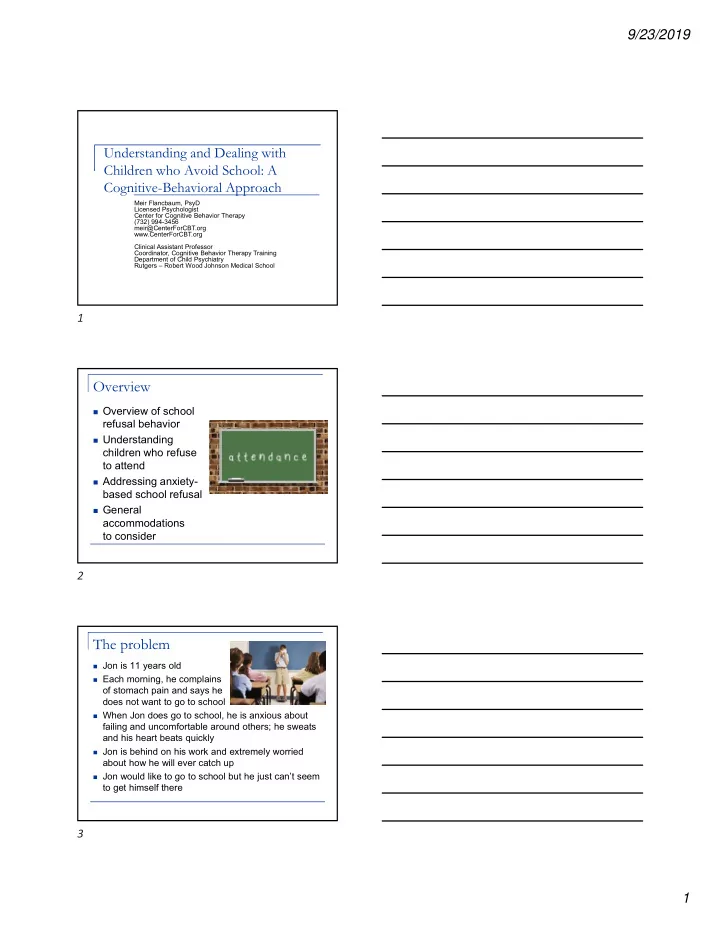

9/23/2019 Understanding and Dealing with Children who Avoid School: A Cognitive-Behavioral Approach Meir Flancbaum, PsyD Licensed Psychologist Center for Cognitive Behavior Therapy (732) 994-3456 meir@CenterForCBT.org www.CenterForCBT.org Clinical Assistant Professor Coordinator, Cognitive Behavior Therapy Training Department of Child Psychiatry Rutgers – Robert Wood Johnson Medical School 1 Overview Overview of school refusal behavior Understanding children who refuse to attend Addressing anxiety- based school refusal General accommodations to consider 2 The problem Jon is 11 years old Each morning, he complains of stomach pain and says he does not want to go to school When Jon does go to school, he is anxious about failing and uncomfortable around others; he sweats and his heart beats quickly Jon is behind on his work and extremely worried about how he will ever catch up Jon would like to go to school but he just can’t seem to get himself there 3 1
9/23/2019 What’s in a name? School Refusal: Poorly named, but well defined Child-motivated absenteeism from school Chronic tardiness or leaving school early Tantrums/complaints before finally going to school Extreme distress when at school An umbrella term for chronic absenteeism School phobia, separation anxiety, and truancy Not a formal diagnosis 4 Absenteeism is only the tip of the iceberg Prevalence of psychiatric diagnoses among youth with school attendance problems Disorder % No diagnosis 32.9 Separation anxiety disorder 22.4 Generalized anxiety disorder 10.5 Oppositional defiant disorder 8.4 Major depression 4.9 Specific phobia 4.2 Social anxiety disorder 3.5 Conduct disorder 2.8 Kearney and Albano, 2004 5 Why target school refusal? Short term consequences Poor academic performance Impaired social development Depression and suicide ideation Long term consequences Criminal behavior Marital problems and social isolation Difficulty maintaining employment Psychiatric problems Kearny & Tollotson, 1998; Kearney, 2006 6 2
9/23/2019 Comprehensive Assessment Child Parent Medical School Providers 7 Clinical Interviews Student’s interests and goals Differential diagnosis interview, especially anxiety disorders, depression, suicide Home environment, including parent attitude, discipline style, and stressors School view of the challenging behaviors Understand nature of school avoidance and possible legitimate factors that may contribute to it (e.g., medical condition) 8 Questionnaires School Refusal Assessment Scale – Revised; parent and child versions Screen for Child Anxiety Related Disorders (SCARED); parent and child versions Child Depression Inventory (CDI) 9 3
9/23/2019 Getting to the root of the problem Access Avoidance Tangible rewards: Objects or people: Alarms, playgrounds, Sleeping late, TV, friends, crowded hallways, buses, delinquency, substance teachers, peers, use Attention from parents or Performance/evaluative significant other: non- situations: tests, recitals, compliance, tantrums, public speaking clinging Understanding what maintains school refusal is the key to its effective treatment Kearney & Albano, 2007 10 Reasons for School Refusal: Trends Children ages 5-11 Avoid objects/people that evoke negative affect Receive attention Children ages 12-17 Escape social or evaluative situations Obtain tangible rewards 11 Maintenance of anxiety-based absenteeism Anxious Thoughts Anxious Feelings “I’m so behind I’ll never Dizziness, heart racing catch up on my work” X Temporary Relief Escape/Avoidance Calmness at home Don’t go to school 12 4
9/23/2019 Habituation Peak Distress Anxiety Time Wagner, 2000 13 Strategies for parents, teachers & counselors Externalize Separate the child from his behavior Avoid “blaming” the child or assuming manipulation Empathize Listen and acknowledge Label triggers, thoughts, and feelings Encourage Cheerlead and provide labeled praise Problem solve with the child Prompt use of coping strategies Don’t enable avoidance or be overly reassuring 14 Typical interventions for children Anxiety education Cycle of anxiety and the ‘false alarm’ Thoughts-Feelings-Actions education What we think impacts how we feel Cognitive restructuring Is this a ‘false alarm’? Thought challenging and coping talk Relaxation training Can be helpful, or problematic if not used correctly Problem solving What can I say or do to make the situation less fearful? Creating a fear hierarchy/bravery mountain Graded exposure/practice Contingency management 15 5
9/23/2019 CBT Model Thoughts Actions & Feelings Behaviors 16 The Fear Plan F eeling frightened? E xpecting bad things to happen? A ttitudes and actions to help R eview and Reward Kendall & Hedtke, 2006 17 School Accommodations to consider Teacher education about school refusal Increased developmentally appropriate labeled praise Prompting use of coping strategies “Break pass” to speak with trusted adult or counselor Call home Additional time in preferred activity (e.g., club) Jobs around the school (e.g., library or computer room) Modified assignments or testing conditions Modified schedule (e.g., attend only certain classes) Alternative classroom setting 18 6
9/23/2019 A comment about accommodations Determined based on what is maintaining the school refusal behavior Are viewed as temporary and should be faded with progress 19 School-Family Partnership Assessment and plan creation with joint input Communicate on a regular basis Jointly develop and regularly review the hierarchy, use of coping skills, and progress with exposure Avoid blaming language Work together to decrease parent factors that are maintaining school avoidance Praise successes Determine reasonable and appropriate accommodations (Consider 504 or IEP) As needed, collaborate with an outside expert in school avoidance to assist in assessment and treatment 20 Center for Cognitive Behavior Therapy Expertise in the following clinical areas: Tics and Tourette syndrome Trichotillomania and skin picking Anxiety and obsessive-compulsive disorders Attention deficit hyperactivity and disruptive behavior disorders Depression, cutting, suicide, and mood dysregulation Clinical and consultation services include: Cognitive behavior therapy for children and adolescents Behavioral parent coaching and support School-based consultation and behavior plan development Workshops for parents, educators, and mental health professionals To make a referral, schedule an in-service, or learn more: Call: 732-994-3456 Email: info@CenterForCBT.org Visit: www.CenterForCBT.org 21 7
Recommend
More recommend